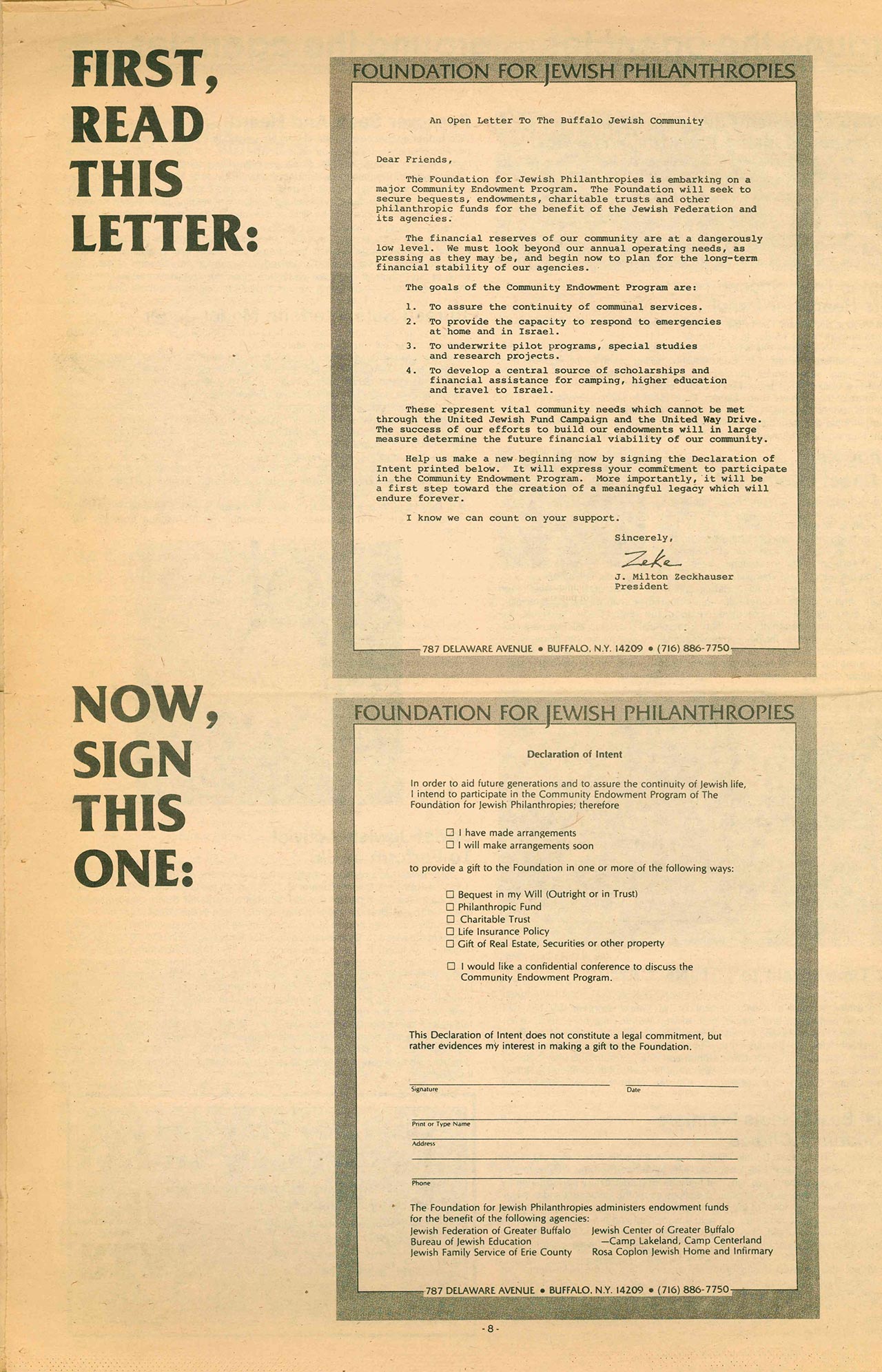Agencies / Foundation for Jewish Philanthropies
The Foundation for Jewish Philanthropies traces its history back to a meeting of community leaders at Zion House in March 1911. At this time they created a nonprofit charitable organization to hold bequests and other long-term funds that would aid with community planning and development. Since 1911, the organization has become a multifaceted community foundation that manages and distributes charitable legacies, bequests, trusts, endowments and other philanthropic funds.
Historical Context
Just after the turn of the twentieth century in 1903, a series of charities federated to coordinate annual campaigns. This structure, the Federated Jewish Charities of Buffalo, a forerunner to the Buffalo Jewish Federation, ran combined annual appeals to fund the immediate needs of Jewish organizations in Buffalo. By 1900s the Jewish population was ten times its size of just thirty years earlier. In 1911, it was projected to double again within fifteen years. At that time, community leaders were exploring ways in which long term capital expenses might be organized. On March 23, 1911, Henry Weill, August Keiser, Mrs. Marcus Spiegel, Jacob G. Joseph, Emanuel Boasberg, Solomon Ginsburg, Isaac E. Harris, Theodore Hofeller, Solomon Morrison and Mrs. Edward Warner met at Zion House, then at 456 Jefferson Avenue in East Buffalo. At this meeting they formed a structure to raise permanent funding for the Jewish community. Distinguishing between the role of the Federated Jewish Charities of Buffalo, the trustees of the nascent Foundation (then known as the Jewish Federation of Buffalo), set out to manage the long-term permanent funds of the community, including bequests and trusts, scholarship and building funds, and use the income from these funds for the benefit of community organizations as determined by their specific fund creators. Working through a Board of Trustees, the Sinking Fund Commissioners, as they were known, eventually widened the range of fund oversight to include property donation, life insurance, stocks, bonds and other assets.
The early Foundation began its work with a bequest left by Dr. Jerome Hilton Waterman of $20,000 in memory of his parents, Herman and Melvina Waterman which continues to benefit the Jewish Federation of Greater Buffalo and the Jewish Community Center of Greater Buffalo today. Other individuals followed their examples, establishing funds that supported specific organizations as well as specific causes. Increasingly in the 1950s and 1960s, it was these bequest style funds from the estates of Jewish community members that enabled the community to address its capital funding and long range needs that annual operating funds could not support. During this era, demand for both significant operating funds and capital funds rose with the development of Camp Centerland, the Jewish Community Center and the Rosa Coplon Old Jewish Folks Home as well as other organizations.
This ongoing and expanding need convinced community leaders to build on the work of the Foundation for Jewish Philanthropies, introducing a series of changes from 1961. The effects of the Tax Reform Act of 1969, spurred further changes, and in 1975, Sydney S. Abzug, after retiring as Executive Director of the Jewish Federation, began work as a part-time consultant to the Foundation for Jewish Philanthropies (FJP). An Adhoc Review Committee in 1979 concluded that the purpose and use of the funds of the Foundation for Jewish Philanthropies were underdeveloped and new committees were formed over the next two years to expand the Foundation for Jewish Philanthropies. A “Declaration of Intent” program, headed by Ruth Kahn [Stovroff] enabled community members to include the FJP in their wills.
During his tenure as President, J. Milton Zeckhauser, encouraged an endowment development program that expanded considerably in 1982. From 1982 a range of other changes were also initiated. The Board of Trustees was expanded and the Foundation’s by-laws were revised and updated. A Certificate of Amendment was filed and the organization’s name changed to the Foundation for Jewish Philanthropies, Inc. Existing committees were revitalized and new committees were formed with the aim of creating a community foundation. Prior to 1982, two types of fund categories existed as “restricted” and “unrestricted.” After 1982, new fund areas and methods of investment expanded the services of the FJP significantly. The first of these new fund areas were Custodial Funds for affiliated agencies. This grouping eventually included organizations ranging in size from Temple Beth Zion to the Hebrew Benevolent Loan Association. Affiliated agencies include synagogues, schools, agencies and other cultural, educational and religious organizations, and service expansion included development consulting, campaign management, marketing, fund administration and financial reporting. Donor Advised Funds, and Charitable Remainder Trust Funds were added.
In addition to fund development, new types of financial services to individuals in the community, and the Jewish community itself, expanded into significant areas. As the Foundation for Jewish Philanthropies increased its range of affiliates and fund areas, aiding with capital financing became an ongoing part of its work. This activity enabled multiple expansions at the Weinberg Campus, building campaigns at synagogues, summer camps, campaigns to redesign, renovate refurbish and expand both Jewish Community Centers, as well as organizational merger management. A more recent focus on cooperative individualized asset management to facilitate personal charitable choices has continued with Planned Giving through the Legacy Program.
As of 2020, the Foundation for Jewish Philanthropies manages endowments, bequests, legacies, restricted funds, life insurance, and supports capital projects through financing, as well as being a significant grant distributor as recommended and designated by its donors. Grants and loans are made for new initiatives, innovative programs and special community projects, academic scholarships and financial aid to individuals and families in need. The Foundation for Jewish Philanthropies role in community building, through its mission and multi-million distribution of donor directed grants to over a thousand Jewish and non-Jewish organizations worldwide, continues to expand each year. Jewish organizations in Buffalo and organizations and causes in diaspora communities around the world, as well as organizations in Israel, have been aided by funds managed under the Foundation for Jewish Philanthropies. In addition many non-Jewish organizations in Buffalo and elsewhere including local arts, cultural, music and medical charities and organizations have also benefitted from the monies distributed by donor direction through the Foundation for Jewish Philanthropies. From under $1million in assets in 1982, the assets of the Foundation for Jewish Philanthropies have grown to over 1,000 funds and with total assets in excess of $220 million.
Locations over time
financial statement
To read the most recent financial statement online, click here.
past presidents
For a listing of past presidents of the foundation click here.





